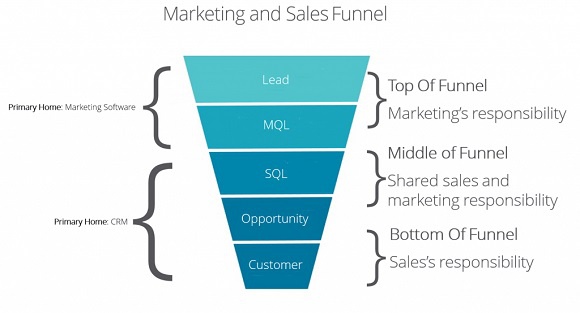Many businesses will not openly admit it but there seems to be a ‘sibling’ rivalry between sales and marketing teams. This ‘cold war’ has been raging for so long that many business decision makers get so confused about how to make these two teams work towards a goal effectively. When it comes to your business success a mistrust and miscommunication between sales and marketing can act like a weight slowing your company’s growth. The fact is, your business future growth depends on these two departments.
Sales and marketing work for a common goal of driving revenue through customer acquisition and retention, however, there is a difference in their work and these differences in the nature of their work could be said to be the culprit for the tensions.
This blog will try to explain why there seems to be tension between these two teams. Where the differences lie in their jobs and how to make both accountable to one single goal; which is to help your business grow.
According to a research by HubSpot, companies with sales and marketing teams working together for a common goal generated 208% more revenue! (Wow!). The same research found out that when sales and marketing teams work together, companies see 36% higher customer retention and 38% higher sales win rates. So why the sibling rivalry?
Let try and give some of the major reason we often hear for this sometimes-unseen rivalry.
The issue is many marketers spend considerable time studying the art and science of their profession as part of a university degree. They most often believe that a great marketing strategy is a key to driving in the targeted revenue. They are of the view that sales team doesn’t respect their job and the support that marketing provides. This leads marketers to wonder why sales get the lion’s share of the credit when revenue targets are achieved.
Recently there was a story about, a company’s founder who gave the sales team a toast and a speech full of praise about how well they did the previous year in helping the company meet its goals for that year at a company end of year dinner. There was no mention of the marketing team effort. The leader on the marketing table could not help than to clear his throat, just a bit loud enough for half the room to hear.
Salespersons, on the other hand, believe that marketing spends too much money and their effort shows little returns. They believe they are out of touch with what is really driving customers and their lack of front-line exposure leads them to set up initiatives that will have an insignificant effect on sales results.

Now let us dive a little into what these two teams actually do and the difference that lies in their work. You having a fair idea of what they do well in a long run help you in your recruiting efforts and even calm the tensions between your sales and marketing team. Ready, let go!
In business, you have what’s known as a sales and marketing pipeline. It’s shaped like a funnel; where you dump leads into the big end of the funnel, and then customers come out from the little end.
The big end of the funnel is marketing. By definition, it has to reach a large number of people. This means that marketing departments communicate with large numbers of people simultaneously.
For instance, in a typical marketing department, you’ll most often see a people working on activities like buying ads, writing copy, creating surveys, sending bulk-email, organizing webinars, etc. These tools allow a single person to send a message to many potential customers simultaneously, either online, or through print, radio, or television.
Sales, on the other hand, involves a personal contact between a salesperson and a potential customer, and they stay with the deal until it’s closed. Think about when you bought your first property be it a car or a land, a sales rep met you, he spent individual time with you, walked you through all the choices, helped you with the paperwork, and closed the deal.
So, in a nutshell, marketing people do a lot of remote-interactions like writing, doing graphics, websites, advertisements while salespeople, on the other hand, are talking, using phones, shaking hands, and closing deals.
Now, having explained why the seeming rivalry and the differences that are in their jobs.
How can you a business owner or leader having noticed tensions in your team make them work together?
To bring the best out of the teams the concept of SMarketing can be put into practice. This concept makes sales and marketing groups jointly accountable to a shared revenue target, while in many instances sharing budgets and incentives. With SMarketing strategy, the value and contribution of each team is felt throughout the entire sales process.

The strategy makes marketing own the top of the sales funnel with sole responsibility for creating customer interest, while the sales team waits to be passed leads from marketing, taking sole responsibility for influencing the outcome of the sales process from that point on. Both teams share data during this decision-making process and agree on an outcome. Such an agreement including the provision of compelling data and relevant customer stories from both teams should be collectively seen as part of a joint marketing and sales initiative.
Smarketing is not just a concept as it has been shown to actually work for a business who practice it. Companies with dynamic and adaptable sales and marketing processes reported an average of 10 percent more sales. It has also been said that when sales and marketing work together companies became 67 percent better at closing deals and finally an alignment of sales and marketing impacts revenue growth up to 3 times.
In conclusion, neither sales or marketing is better than the other. They are both integral parts of a single process, and if either of them is missing the company will fail in most cases. As a business, you need marketing to reach out to generate leads, and then you need a sales team to take those leads and turn them into sales.
How is your sales and marketing team working together? What will you take from this blog to help your business goals? We will love to hear from you, share with us in the comment!
Business News of Tuesday, 31 October 2017
Source: sidekickgh.com













